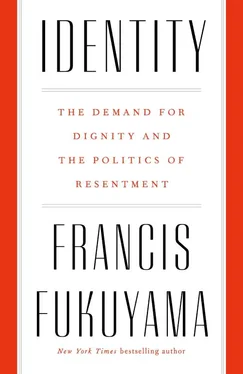National identities have been created by four main paths. The first is to transfer populations across the political boundaries of a particular country, either by sending settlers into new territories, by forcibly evicting people who live in a certain territory, or by simply killing them off—or all three. The third of these was labeled ethnic cleansing during the Balkan wars of the early 1990s and was rightly condemned by the international community. But ethnic cleansing has been used by many countries in the past, including democracies such as Australia, New Zealand, Chile, and the United States, which saw settlers violently removing or killing off the indigenous populations of the territories in which they settled.
The second path to nationhood is to move borders to fit existing linguistic or cultural populations. Historically, this has been accomplished either through unification, as in the case of Italy and Germany in the 1860s and ’70s, or through separation, as when the Irish Republic left the United Kingdom in 1919, or when Ukraine declared its independence from the former Soviet Union in 1991.
The third path is to assimilate minority populations into the culture of an existing ethnic or linguistic group. France was a polyglot nation two hundred years ago, but over time the different local languages such as Provençal, Breton, or Flemish were gradually displaced by Parisian French. Similarly, immigrants to Argentina or the United States—or more likely, their children—learned Spanish or English to fit into the dominant culture and move up the social ladder. The apparent ethnic homogeneity of China, where more than 90 percent of the population are said to be Han Chinese, was the product of a lengthy cultural and biological assimilation of minority populations over three millennia.
The fourth path is to reshape national identity to fit the existing characteristics of the society in question. Contrary to the views of many nationalists, “nations” are not biological entities that have existed from time immemorial; they are socially constructed from the bottom up and the top down. Those doing the constructing can deliberately shape identities to suit people’s characteristics and habits. An example were India’s founders Gandhi and Nehru, who built on an existing “idea of India” that would incorporate that society’s extremely diverse population. {1} The founders of Indonesia and Tanzania in effect created new national languages to unify their highly diverse societies. {2}
The policies that do the most to shape national identity are rules regarding citizenship and residency, laws on immigration and refugees, and the curricula used in the public education system to teach children about the nation’s past. As well, in a bottom-up process, “stories of peoplehood” are told by a society’s artists, musicians, poets, filmmakers, historians, and ordinary citizens who describe their own provenance and aspirations.
One of the most vivid illustrations of how nation building takes place in a democratic society was portrayed in the film Invictus , which tells the story of South Africa’s hosting of the Rugby World Cup in 1995. The new democratic South Africa that emerged from apartheid in the early 1990s was sharply fragmented along racial and ethnic lines. One of the cleavages was in sports, where whites followed rugby and blacks played soccer. The country’s visionary first president, Nelson Mandela, understood the importance of sports to national self-consciousness and deliberately sought to build support for the mostly white national rugby team, the Springboks, among the country’s black population. He did this against the opposition of his own African National Congress. He could not impose this preference on his followers; he had to cajole and persuade them. It helped that the Springboks eventually won the rugby title. They did this by beating New Zealand’s powerful All Blacks, a team that employs a bit of nation building itself when it performs a Maori war dance, the haka, before every game.
All four of the paths to national identity can be accomplished peacefully and consensually, or through violence and coercion. All existing nations are the historical by-product of some combination of the four and drew on some combination of coercion and consensus. The challenge facing contemporary liberal democracies in the face of immigration and growing diversity is to undertake some combination of the third and fourth paths—to define an inclusive national identity that fits the society’s diverse reality, and to assimilate newcomers to that identity. What is at stake in this task is the preservation of liberal democracy itself.
The contemporary European struggle over national identity begins with the founders of the European Union, Robert Schuman and Jean Monnet, who understood that exclusive ethnic definitions of national identity had been at the root of the two world wars that Europe experienced. {3} As an antidote, they created the European Coal and Steel Community in 1951, composed of France, Belgium, West Germany, Italy, the Netherlands, and Luxembourg, which was designed to prevent German rearmament while facilitating trade and economic cooperation in a formerly integrated region that had been ripped apart by war. The Coal and Steel Community evolved in stages into the European Economic Community and eventually into the EU, with a membership that grew steadily to encompass the current twenty-eight members.
The founders of the European Union deliberately sought to weaken national identities at the member-state level in favor of a “postnational” European consciousness, as an antidote to the aggressive ethno-nationalisms of the first half of the twentieth century. {4} The hope of these founders was that economic interdependence would make war less likely, and that political cooperation would follow on its heels. In many ways, they were wildly successful: the idea that Germany and France, the two main antagonists of the world wars, would ever go to war with each other is vanishingly remote today. A stratum of young, usually well-educated Europeans are now born in one member state, get their education in another, marry someone from yet another country, and work in multiple locations within the EU and farther afield. They retain an awareness of their birth nationality, but their lives are tied to the EU as a whole.
But whether “Europe” has an identity stronger than the old national identities it was supposed to supersede is not clear. In the EU’s early decades, it was not politically acceptable to celebrate national identity too loudly at a member-state level. This was particularly true for countries such as Germany and Spain that had fascist pasts: citizens did not wave national flags, sing national anthems, or cheer too loudly for their country’s sports teams. For them Europe was a refuge, but not necessarily a preferred destination.
But the leaders of the EU were not in a position to invest much effort in building an alternative new identity. {5} They did not create a single European citizenship; rules for citizenship remained the province of individual member states. The symbols of nationhood such as a flag and an anthem came late, and the EU’s diverse membership had no common civic education. But the most important failure was in the democratic accountability of the EU itself. The most powerful institution within the EU was the European Commission, an unelected technocratic body whose main purpose was to promote a single market within Europe. It was answerable to the people only indirectly, via the Council of Ministers, which represented the individual member states. A directly elected European parliament had rather limited powers, which has consequently failed to generate significant voter turnout or enthusiasm. Citizens of Europe knew that the important votes they cast were still those at the member-state level, and their chief energies and emotional attachments were directed there. As a result, they felt little sense of ownership or control over the institutions governing Europe as a whole.
Читать дальше












